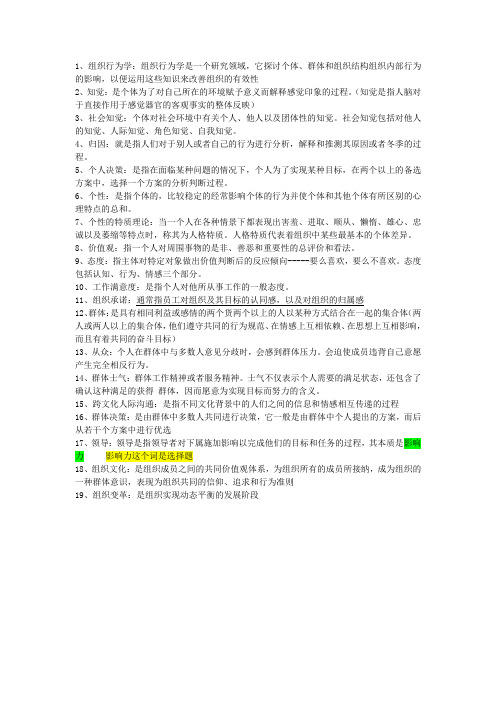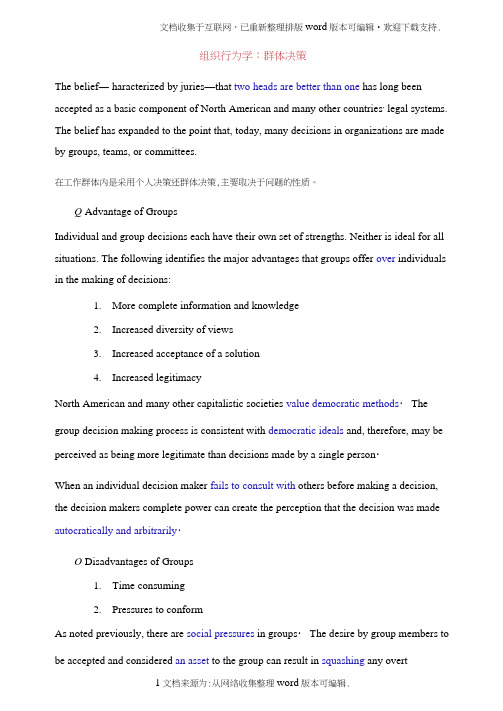组织行为学:群体决策
组织行为学讲义第十六章

第十六章团队建设与群体决策教学目的与教学要求:通过本章的学习,应重点掌握团队及其特点,以及团队与群体的异同。
掌握团队的三种主要类型。
掌握影响团队绩效的主要因素。
掌握采用团队形式的好处和团队组织的适用范围,掌握高即席团队的主要特征。
掌握群体决策的性质。
重点掌握群体决策的利弊,以及群体决策中的主要问题。
掌握提高群体决策有效性的基本方法。
1.团队的概念及其特点2.团队与群体区别3.团队的类型4.影响团队绩效的因素5.采用团队形式的好处6.高绩效团队的特征7.团队组织的适用范围8.群体决策的性质9.群体决策的利弊10.小集团意识对群体决策的影响11.极端性转移对群体决策的影响12.群体决策的有效性*********************************************************第一节团队与群体一、团队及其特点二、团队与群体比较三、团队的类型四、影响团队绩效的因素*********************************************************一、团队及其特点一、团队及其特点团队是由一群不同背景、不同技能、不同知识的人所组成的一种特殊类型的群体,它以成员高度的互补性、知识技能的跨职能性和信息的差异性为特征。
首先,团队成员之间有高度的相互依赖性,往往是处于复杂的互动之中。
其次,一个团队内应具有执行不同职能的成员,从而使这个团队成为跨职能的群体。
最后,由于成员间在背景、训练、能力、所接近的资源方面的差异,一个团队的成员在技能、知识、专长及信息的分配上是不平均的。
团队与传统的部门结构或其他形式的稳定性群体相比所具有的优点主要在于:(1)它可以使不同的职能并行进行,而不是顺序进行,从而大大地节省了完成组织任务的时间;(2)它可以迅速地组合、重组和解散;(3)它可以由团队成员自我调节、相互约束,促进员工参与决策过程,增强组织的民主气氛,并且削减组织中的某些中层管理职能。
组织行为学——群体决策

群体决策的缺点
2、极化现象
群体成员的观点不断朝着更 极端的方向转移,而这个方 向是讨论前他们已经倾向的 方向。
造成群体极化的原因
1、群体使个人的责任得到分散
2 、群体内的信息交流使个体倾向于认为自己 已经掌握了足够多的信息。 3 、群体领导者的冒险信息促进了整个群体的 冒险性。 4 、社会比较的机制使群体成员之间互相影响。
5、竞争的群体气氛鼓励冒险。
群体决策的优点
丰富的信息
群体决策的缺点
群体思维 极化现象
提高决策过程的质 量
决策更容易被接受
其他问题
群体决策与个体决策的比较
群体决策效果好ห้องสมุดไป่ตู้
个体决策效率高
速度 正确 性
个体决策 快 较差
群体决策 慢 较好
创造 性
风险 性
较大,适合创新
取决于个人
较小,适合程序 化
若成员(领导)富 有冒险性,则更 趋于冒险。反之 亦然。
群体决策的优点
丰富的信息 提高决策过程的质量 决策更容易被接受
群体决策定义
群体决策是群体成员共同参与做出决定的 过程。群体决策主要研究多人、多个决策 主体如何做出“统一”的有效抉择。
多个个体组成群体,个体间可能是合作的, 也可能是竞争的,还可能是复杂联合的以 及合作基础上的有限竞争等。但必须合作 抉择出统一的决策行为。
沙漠逃生
有一架飞机,在沙漠中 发生意外,你和一部分 生还者面临生死存亡的 选择……
群体决策的缺点
组织行为学(名词解释)

1、组织行为学:组织行为学是一个研究领域,它探讨个体、群体和组织结构组织内部行为的影响,以便运用这些知识来改善组织的有效性2、知觉:是个体为了对自己所在的环境赋予意义而解释感觉印象的过程。
(知觉是指人脑对于直接作用于感觉器官的客观事实的整体反映)3、社会知觉:个体对社会环境中有关个人、他人以及团体性的知觉。
社会知觉包括对他人的知觉、人际知觉、角色知觉、自我知觉。
4、归因:就是指人们对于别人或者自己的行为进行分析,解释和推测其原因或者冬季的过程。
5、个人决策:是指在面临某种问题的情况下,个人为了实现某种目标,在两个以上的备选方案中,选择一个方案的分析判断过程。
6、个性:是指个体的,比较稳定的经常影响个体的行为并使个体和其他个体有所区别的心理特点的总和。
7、个性的特质理论:当一个人在各种情景下都表现出害羞、进取、顺从、懒惰、雄心、忠诚以及萎缩等特点时,称其为人格特质。
人格特质代表着组织中某些最基本的个体差异。
8、价值观:指一个人对周围事物的是非、善恶和重要性的总评价和看法。
9、态度:指主体对特定对象做出价值判断后的反应倾向-----要么喜欢,要么不喜欢。
态度包括认知、行为、情感三个部分。
10、工作满意度:是指个人对他所从事工作的一般态度。
11、组织承诺:通常指员工对组织及其目标的认同感,以及对组织的归属感12、群体:是具有相同利益或感情的两个货两个以上的人以某种方式结合在一起的集合体(两人或两人以上的集合体,他们遵守共同的行为规范、在情感上互相依赖、在思想上互相影响,而且有着共同的奋斗目标)13、从众:个人在群体中与多数人意见分歧时,会感到群体压力。
会迫使成员违背自己意愿产生完全相反行为。
14、群体士气:群体工作精神或者服务精神。
士气不仅表示个人需要的满足状态,还包含了确认这种满足的获得群体,因而愿意为实现目标而努力的含义。
15、跨文化人际沟通:是指不同文化背景中的人们之间的信息和情感相互传递的过程16、群体决策:是由群体中多数人共同进行决策,它一般是由群体中个人提出的方案,而后从若干个方案中进行优选17、领导:领导是指领导者对下属施加影响以完成他们的目标和任务的过程,其本质是影响力影响力这个词是选择题18、组织文化:是组织成员之间的共同价值观体系,为组织所有的成员所接纳,成为组织的一种群体意识,表现为组织共同的信仰、追求和行为准则19、组织变革:是组织实现动态平衡的发展阶段。
组织行为学(群体决策方法)

组织行为学
6
群体决策方法
名义群体法的优、缺点
优点:
组织行为学
使群体成员正式开会但不限制每个
人的独立思考和个体思维,传统的会议 方式往往做不到这一点。 缺点: 如果某些人因为缺乏自
信或表达能力差,但却有真知
灼见的人行为学
德尔菲法
集中各方面专家的意见预测
需要经过3~4轮的信息反馈,每次反馈中
使调查组和专家组进行深入研究。 统计性: 每种观点都包括在这样的统计中,避免了 专家会议法只反映多数人观点的缺点。
9
群体决策方法
德尔菲法的优、缺点
优点:
组织行为学
无干扰地集中专家意见,
有助正确决策。
缺点: 反复多次,相当繁琐。
10
群体决策方法
未来事件的方法。其大致流程是: 在对所要预测的问题征得专家的 意见之后,进行整理、归纳、统 计,再匿名反馈给各专家,再次 征求意见,再集中,再反馈,直 至得到一致的意见。
8
群体决策方法
德尔菲法特性
匿名性:
组织行为学
所有专家组成员不直接见面,只是通过函
件交流,这样就可以消除权威的影响。 反馈性:
组织行为学
为了保证群体决策 的创造性,提高决策质量, 管理上发展了一系列改善 群体决策的方法。
1
群体决策方法
组织行为学
头脑风暴法
把有关人员召集在一个和谐的环境里,参加者无
拘束地发表意见,规定任何人不得对他人的意见进行 反驳,鼓励大胆自由思考,思路越广、意见越多越受 欢迎,但可以协商后联合提出意见。常用在决策的初 级阶段,以解决组织中的新问题或重大问题。
组织行为学
电子会议法
组织行为学(群体决策概述)

组织行为学
2
群体决策概述
决策分类
个体决策
个人(决策者)所进行的决策,
个人承担决策的责任
组织行为学
群体决策
一个团体所进行的决策。 群体决策是组织中的普遍
现象。人们对群体决策是
基本信念来自:正确、完 备、民主、集体利益。
3
群体决策概述
个体决策VS群体决策
个体决策
个体决策最大的长处是速度
授课内容 群体决策概述
现实生活中,决策往往是群体行为, 是由多人参加的活动
组织行为学
1
群体决策概述
群体决策定义
群体决策是群体成员共同参与做出 决定的过程。群体决策主要研究多人、 多个主体如何做出“统一”的有效抉择。
多个个体组成群体,个体间 可能是合作的,也可能是竞争的, 还可能是复杂联合的以及合作基 础上的有限竞争等。但必须合作 抉择出统一的决策行为。
效果以速度来定义,个体决策较优越 效果以创造性程度来定义,群体决策较优越 效果以最终决策的接受程度来定义,群体决策 较优越
组织行为学
从消耗的工作时间来讲,群体决策的效率低。
决策是否采用群体决策,主要考虑的是
效果的提高是否能弥补效率的损失。
6
组织行为学
组的责任 个体决策通常传递一致的价值观
组织行为学
4
群体决策概述
群体决策
群体能产生更完整的信息和知识 群体能给决策带来多样化 群体可带来方案接受度的增加 群体决策过程更为合法
组织行为学
5
群体决策概述
个体决策比群体决策更有效率, 而群体决策比个体决策更有效力
组织行为学简答题

组织行为学简答题(附答案)1.群体决策有何优缺点?答:群体决策的优点:群体决策可以集思广益、开拓思路、克服偏见,提高群体的凝聚力。
具体表现在以下几个方面:(1)群体决策在确定目标时,目标的合理性、可行性和可接受性优于个人决策。
(2)群体决策可提供更多的备择方案。
(3)群体决策对活动结果的评估更为客观。
群体决策的缺点:(1)风险转移现象;(2)群体思维;(3)较少选择性;(4)对偏爱的选择没有再检验;(5)对淘汰的选择没有再检验;(6)否决专家意见;(7)对新信息存有偏见;(8)没有权宜之计。
2.什么是情商?主要内容是什么?答:情商是指个体对情绪的知觉和调节能力,以及对情绪进行的思考能力。
主要包括四个内容:一、情绪的知觉,评估和表达能力;二、思绪过程中的情绪促进能力;三、理解与分析情绪,可获得情绪知识的能力;四、对情绪进行成熟调节能力。
3.我实现人假设的主要内容是什么?答:“自我实现人”假说。
“自我实现人”是指每个人都需要发挥自己的潜力,表现自己的才能,只有自己的才能表现出来,自己才得到最大的满足。
“自我实现人”假说的主要内容可以概括为以下几点:①人并非生来是懒惰的,要求工作是人的本能。
②在适当的条件下,人们不但愿意而且主动工作。
③人有追求满足欲望的需要,职工的自我实现倾向与组织所要求的行为之间没有矛盾,只要管理适当,人们会把个人目标与组织目标统一起来。
④人并非必然会对组织目标产生抵触和采取消极的行为,主要是由于压力造成的。
⑤人对自己所参与的工作目标,能实行自我指挥和自我控制。
⑥大多数人都有组织问题的想象力和创造力,在现代工业社会中,人的智力没有充分发挥出来。
4.介绍双因素理论的主要内容。
答:双因素理论是美国心理学家赫兹伯格于1959年提出来的,全名叫“激励、保健因素理论”。
通过在匹兹堡地区11个工商业机构对200多位工程师、会计师调查征询,赫兹伯格发现,受访人员举出的不满的项目,大都同他们的工作环境有关,而感到满意的因素,则一般都与工作本身有关。
组织行为学 群体决策误区(一)

2
群体思维
组织行为学
案例——猪湾惨败
1961年4月17日在美国中央情报局的协助下逃亡美国的古巴
人向菲德尔· 卡斯特罗领导的古巴革命政府进行的一次武装进攻。 然而结果并不像决策者们预先想象的一样,古巴军民经过72小
时的战斗,全歼了被包围在吉隆滩的美国雇佣军,共有114名雇
佣军被古巴军队击毙,其余1113人被俘获。这就是震惊世界的 吉隆滩之战,美国称之为猪湾事件。对美国来说这次未成功的 进攻不但是一次军事上的失败,而且也是一次政治上的失误。 国内外对这次进攻的批评非常强烈,刚刚上任90天的约翰· 肯尼 迪政府为此大失信誉,相反的卡斯特罗政权和古巴革命被巩固。 由于古巴(有理地)担心美国再次进攻,因此古巴开始与苏联 靠近,这个靠近不断升级最终导致了1962年的古巴导弹危机。
8
组织行为学
组织行为学
9
3
群体思维
一个集体其内聚性越高,越容易导致群体思维的错误。
顾问团产生了一个错觉,认为他们的计划完美无缺, 而卡斯特罗政权不及美国的政权好。 顾问团的意见好像是一致的,但实际上并非如此, 曾有人提出不同意见,但未敢坚持,因而造成了意 见一致这样一个错觉。 对不同意见者有很大压力。
组织行为学
顾问团认为肯尼迪是正确的,因而顺从了他的意见。
4
群体思维
组织行为学
群体思维特征
群体成员认为任何对他们所作假设的抵抗都是不合理 成员忙压制怀疑者,以支持多数人赞同的可选方案 为了表现出一致同意,怀疑者对自己的怀疑保持沉默, 甚至降低疑点的重要性 群体将成员的沉默理解为默认的支持大多数
5
群体思维
组织行为学
群体思维实例
珍珠港事件
组织行为学群体行为的基本原理

2 2 规范
8-12
规范–群体成员共同接受的行为标准;规定了他们在特定的 情境下应该或不应该做的事情
影响行为的有力手段 绩效规范 外表规范 社会安排规范 资源分配规范
2 2 规范:霍桑实验
8-13
1924—1932年间;由埃尔顿·梅奥Elton Mayo领导;在芝加哥的西方电气公司所 属的霍桑工厂进行的一系列研究
主要结论:
生产率的提高是因为被调查群体人员受到关注而不是因为环境 的改变
员工行为与情感紧密联系 群体的力量显著地影响个人的行为 群体的标准决定单个工人的产出 与群体标准 群体情感和安全感相比;金钱是决定产出的次要因
素
2 2 规范:从众行为
8-14
从众:群体能够对其成员施加巨大的压力;使他们改变自己 的态度和行为;以符合群体的标准
2 4 规模
8-21
小群体完成任务的速度比大群体快–成员执行力更强 在解决复杂和困难问题方面;大群体比小群体做得更好 大群体有利于获取各种渠道的信息 小群体在利用这些信息从事生产方面
效果更好
2 4 社会惰性Social loafing
8-22
社会惰化:个体在群体中工作不如单独一个人工作时更努 力的倾向 例如:拔河
由组织结构确定 工作分配明确 非正式群体
既没有正式的结构也并非由组织安排 为了满足社会交往需要在工作环境中自然形成的
1 2 群体的四种类型
8-5
正式群体
命令型群体–由组织结构图 确定
任务型群体–为完成某项工 作而一同工作的个体组成
非正式群体
利益型群体–团结起来去 实现与每个个体都有切身 利益 共同关心的具体目标
参照群体: 在参照群体中;人们互相意识到其他成员的存在;将自己 定义为群体成员或者希望成为该群体的成员;并且感到群 体成员对自己意义重大 个体努力遵从这些群体的规范
组织行为学复习资料

一、群体决策•群体决策就是由多人组成的群体进行的决策。
•克服个人决策中个人认识的局限•群体决策优点:提供更多信息;产生更多解决问题的方案;使决策更容易被接受性;决策过程和结果更加合法;高满意度缺点:浪费时间;少数人控制局面;责任含糊不清;群体成员从众压力大;群体思维•效率与效果:群体决策优于群体中平均的个人所做的决策;速度;创造性;接受程度;效率,效果;•群体决策组成的互补性原则,提高效率。
群体决策的结构互补:•知识结构互补•性格、气质和决策风格的互补•年龄、性别、所处阶层的合理分布•决策群体的人数。
5—11人的中等规模群体决策最有效;4 —5人的群体容易使成员感到满足;2 —5的小群体容易使达成一致。
群体决策与风险心理:•个人决策,对决策方案的风险偏好取决于个性的冒险性。
•群体决策中群体动力的作用下,风险心理表现为“冒险转移”现象。
•实验研究表明:群体决策的冒险水平要高于个人决策冒险的平均水平。
群体决策中冒险水平增加的现象就是所谓“冒险转移”现象。
•日常观点:群体决策更小心谨慎,更倾向于保守,“冒险转移”现象证明群体行为有相反的趋向。
•在组织管理过程中,个人决策从理论上应该比集体决策更稳妥和安全。
二、冲突•冲突是指两个或两个以上的社会单元在目标上互不相容或互相排斥,从而产生心理上的或行为上的矛盾。
•冲突不仅使个体体验到一种紧张情绪,还会影响群体内人与人的关系,包括群体之间关系。
•冲突对象是目标不同的另一方,竞争的双方则具有同一目标,不需要发生势不两立的争夺。
•竞争和冲突的区别在于一方所采取的行动是否会影响另一方目标的实现。
如果双方都能从竞争结果中获益,那么竞争就不可能变为冲突。
冲突的演变•传统观点:20世纪40年代中期之前,冲突是管理不善的结果,有害无益。
应当避免冲突。
•现代观点:冲突是不可避免的,保证高绩效所必需的;有的冲突有害;冲突可促使寻求新的策略和方针,帮助克服停滞和自满情绪。
•处理冲突:确认适宜的冲突水平;选择减少冲突的策略;在冲突不够强烈的地方,管理者也可以有意识地引起冲突。
组织行为学名词解释

名词解释:1.组织行为学是研究组织中人的心理和行为表现及其规律,提高管理人员预测、引导和控制人的行为的能力,以实现组织既定目标的科学。
2.晕轮效应指人们对他人的认知判断首先是根据个人的好恶得出的,然后再从这个判断推论出认知对象的其他品质的现象。
3.近因效应是指当人们识记一系列事物时对末尾部分项目的记忆效果优于中间部分项目的现象。
4.从众行为:个体在群体的引导或压力之下,观念或行为朝向与多数人相一致的方向变化。
5.群体决策:环境信息、个人偏好、方案评价方法是一个决策好坏的关键。
而这些又与个人的经验和对问题的理解有关,特别是对于复杂的决策问题,不仅涉及到多目标、不确定性、时间动态性、竞争性,而且个人的能力已远远达不到要求,为此需要发挥集体的智慧,由多人参与决策分析,这些参与决策的人,我们称之为决策群体,群体成员制订决策的整个过程就称为群体决策。
6.群体规范:群体成员共同接受和遵循的指导行为的规则。
群体规范告诉群体成员在群体中应该做什么事情,不应该做什么事情。
7.交叉沟通,是指组织内不同层级部门间或个人的沟通,它时常发生在职能部门和直线部门之间。
例如营销经理与品管课长之间的往来。
8.平行沟通,又称横向沟通,指的是与平级间进行的与完成工作有关的交流。
9.群体凝聚力:是影响群体结构的一个重要因素,就是一种吸引群体成员,使得他们愿意留在群体内的力量。
10.组织变革是指组织用系统思想加以指导后发生的一些变化。
简答题:1.激励的一般原则: 物质激励与精神激励相结合原则,正激励与负激励相结合原则,内在激励与外在激励相结合原则,按需激励原则,组织目标与个人目标相结合原则,严格管理与思想工作相结合原则2.影响员工满意度的因素:工作本身,报酬,晋升,认可,福利,工作条件,上司,同事,公司与管理3.沟通在群体中的作用:使群体或组织成员获得必要的信息以完成工作目标。
沟通也使得群体或组织成员之间相互理解,避免冲突。
沟通是传递集体或组织的规范、文化、观念的途径。
组织行为学原理

组织行为学原理组织行为学原理组织行为学是研究人类在组织中的行为、观念和价值取向等方面的学科。
它主要关注个体在组织中的行为和与其他成员之间的关系,以及影响这些关系的因素。
本文将从以下几个方面介绍组织行为学原理。
一、个体行为1. 个体动机个体动机是指推动人们实现某种目标或愿望的内部力量。
它可以分为内部和外部两种类型。
内部动机来自于个人内心深处,如自我实现、成就感等;而外部动机则来自于外界刺激,如奖励、惩罚等。
2. 个体知觉个体知觉是指个人对周围环境和事件的感知和理解。
它可以影响一个人对事物的态度和决策。
而这种感知又受到许多因素的影响,如经验、文化背景等。
3. 个体学习个体学习是指通过经验和反馈来改变一个人的行为方式。
它可以通过正向强化、负向强化、惩罚和消极反馈等方式实现。
二、群体行为1. 群体动态群体动态是指在组织中成员之间互相影响和相互作用的过程。
它可以分为四个阶段:形成阶段、风暴阶段、规范阶段和执行阶段。
2. 群体决策群体决策是指在组织中成员共同参与制定决策的过程。
它可以通过集思广益、多数原则等方式实现。
3. 群体合作群体合作是指在组织中成员共同合作完成任务的过程。
它可以通过协调和沟通等方式实现。
三、领导行为1. 领导风格领导风格是指领导者处理问题和与下属交往的方式。
它可以分为权威型、民主型和自由型等多种类型。
2. 领导行为领导行为是指领导者在组织中具有的影响力和控制力。
它可以通过激励、赞扬等方式实现。
3. 领导效能领导效能是指领导者对组织目标实现的贡献度。
它可以通过有效地激励下属,提高团队凝聚力等方式实现。
四、组织结构1. 组织设计组织设计是指组织结构和职位分配的过程。
它可以通过层级结构、职能划分等方式实现。
2. 组织文化组织文化是指组织中共同的价值观和信仰。
它可以通过传统、符号和仪式等方式实现。
3. 组织变革组织变革是指组织内部因为外部或内部原因而进行的改变。
它可以通过管理者的领导、员工的参与等方式实现。
组织行为学-第六单元 群体行为

2、群体的分类 、
(1)假设群体和实际群体 )
假设群体或统计群体: 假设群体或统计群体 指实际上并不存在、只是为了研究和分析的需要 而划分出来的群体。 实际群体: 实际群体: 指实际存在的群体,这类群体成员之间有实际的 直接或间接联系。
4
(2)大型群体和小型群体
小型群体: 小型群体: 凡是群体成员之间有直接的、个人间的、面对面的接触 和联系的群体,就是小型群体。 大型群体: 大型群体: 指成员之间是以间接的方式(通过群体的目标、各层组 织机构等)联系在一起的群体。
29
群体思维和群体转移
群体思维或小集团思想( 群体思维或小集团思想(groupthink) ) 美国心理学家杰尼斯(J. Janis)分析了美国历史上若 干重大决策成败的案例后,发现了一种“groupthink” 现象,指“参与一个统一群体中的人们的一种思想作 风,在这个群体中,人为追求思想一致比现实地评价 各种可能行动方案更重要”。
34
名义群体法
指决策过程中对群体成员的讨论或人际沟通加以限制。 (1)讨论之前,每个人先写下自己的看法或观点。 (2)每人逐次向群体说明自己的观点,一次一个。 (3)群体讨论和评价这些观点。 (4)每人对所有观点进行排序。
35
德尔斐法
这种方法最初由美国兰德公司和道格拉斯公司提出, 是一种集中各方面专家的意见,预测未来事件的方法 这种方法的
30
群体思维的表现:
(1)决策中出现不同意见时,试图文饰自己的错误坚持自己的观点。 )决策中出现不同意见时,试图文饰自己的错误坚持自己的观点。 (2)对怀疑多数人共同意见的人施加压力; )对怀疑多数人共同意见的人施加压力; (3)持不同意见者为了与多数人一致而保持沉默,避免意见交锋 )持不同意见者为了与多数人一致而保持沉默, (4)造成一致通过的错觉,认为弃权就是赞成。 )造成一致通过的错觉,认为弃权就是赞成。
群体决策研究

群体决策(组织行为学)摘要众所周知,在一个组织中的众多决策,特别是在涉及有关组织人事和活动等具有重大影响的重要决策时,通常情况都是采取群体共同协商决定的方式。
组织中的群体通过组织委员会和组织领导小组或者是工作管理的审查组、研究组等其他众多方式的制定一套决策。
群体决策在现实组织当中,群体决策有利于我国集中不同领域诸多专家的有关智慧,这样有助于组织解决日益复杂的决策问题。
通过专家们的广泛讨论和参与,这些在专业领域有所建树的专业工作者可以对组织中所存在的问题共同商讨提出具有建设性的建议。
同时群体决策有利于组织内部决策方案在制定贯彻落实之前,能够更加细致的发现决策中所存在的种种问题,有助于组织提高问题决策的科学性、合理性、针对性。
但是同样,没有任何决策是完美无缺的,群体决策同样存在着一些缺陷。
因此,本文将就群体决策的本质含义和群体决策在组织行为当中所具有的优势或者缺陷等做出深入的研究分析。
并且本文还从群体决策执行过程中所存在的种种影响因素以及群体决策在组织行为中的群体思维等进行大致介绍和评述,并提出个人见解。
关键词:群体决策;组织行为学;群体思维;优劣;一、群体决策研究背景当前,随着全球经济一体化的不断深入,社会中的经济环境也随着全球经济一体化的深入而变得日益繁杂。
而且在组织中的管理和决策也随之出现了诸多的困难。
因此,群体的力量在社会组织以及日常的经济生活中的存在感愈来愈强,且这一影响还在不断扩大。
因此当前群体决策逐渐成为了企业、组织管理以及决策的研究焦点。
并且因为现代各个组织、企业在中的组织决策当中普遍是由群体的协调合作来完成的,所以由此可见群体决策是群体在组织、企业当中进行决策的主要形式,也是不可或缺的一个重要环节。
也正是如此,群体决策随着二十年的发展历程已经成为了组织行为学中决策理论研究的一个新兴的领域。
成功的引起了广泛学者对组织行为学当中群体决策的研究兴趣,并且在现阶段其已经发展成为决策理论研究的热点和前沿话题。
群体决策

费时间的事。大家对猿猴的错误决策十分愤慨,群起而攻
7
之。
2020/3/21
8 2020/3/21
第八章 群体决策 第二节 群体思维与群体转移
一、群体思维
➢ 1、群体思维的内涵:指群体中从众压力的存在,使群体对决策中
出现的不同寻常的、少数人的或不受欢迎的观点不能作出客观的评价 。
二、群体转移
➢ 1、群体转移的内涵:在讨论可选择方案、进行决策的过程中
第八章 群体决策 第三节 群体决策技术
二、名义群体法
群体成员 写下自己
的观点
群体成员阐 述自己的观
点
群体成员 讨论观点
观点排序 作出决策
15 2020/3/21
第八章 群体决策 第三节 群体决策技术
三、德尔菲法
➢ 1、在问题明确之后,要求群体成员通过填写精心设计的问卷能解决 问题的方案。
➢ 2、每个群体成员匿名并独立地完成第一份问卷。 ➢ 3、把第一次问卷调查的结果在另一个中心地点整理出来。 ➢ 4、把整理和调整的结果分发给每个人一份。 ➢ 5、在群体成员看完整理结果之后,要求他们再次提出解决问题的方
案。结果通常是启发出新的解决办法,或使原有方案得到改善。 ➢ 6、如果有必要,重复步骤4和步骤5,直到找到大家意见一致的解决
第八章 群体决策 第三节 群体决策技术
一、头脑风暴法 脑力激荡法(brain storming)的意思是克服互动群体中
产生的妨碍创造性方案形成的从众压力。其方法是 ,利用产生观念的过程,创造一种进行决策的程序 ,在这个程序中,群体成员只管畅所欲言,不许别 人对这些观念加以评论。
14 2020/3/21
猿猴说:看谁能游泳?很快推选出青蛙、水蛇等四大
组织行为学:群体决策

组织行为学:群体决策The belief― haracterized by juries—that two heads are better than one has long been accepted as a basic component of North American and many other countries, legal systems. The belief has expanded to the point that, today, many decisions in organizations are made by groups, teams, or committees.在工作群体内是采用个人决策还群体决策,主要取决于问题的性质。
Q Advantage of GroupsIndividual and group decisions each have their own set of strengths. Neither is ideal for all situations. The following identifies the major advantages that groups offer over individuals in the making of decisions:1.More complete information and knowledge2.Increased diversity of views3.Increased acceptance of a solution4.Increased legitimacyNorth American and many other capitalistic societies value democratic methods・The group decision making process is consistent with democratic ideals and, therefore, may be perceived as being more legitimate than decisions made by a single person・When an individual decision maker fails to consult with others before making a decision, the decision makers complete power can create the perception that the decision was made autocratically and arbitrarily・O Disadvantages of Groups1.Time consuming2.Pressures to conformAs noted previously, there are social pressures in groups・ The desire by group members to be accepted and considered an asset to the group can result in squashing any overtdisagreement, thus encouraging conformity among viewpoints.3.Domination by the fewGroup discussion can be dominated by the one or a few members. If this dominant coalition is composed of low・and medium-ability members, the group\ overall effectiveness will suffer.4.Ambiguous responsibilityGroup members share responsibility, but who is actually accountable for the final outcome? In an individual decision, it is clear who is responsible・In a group decision, the responsibility of any single member is watered down・Effectiveness and efficiency: whether groups are more effective than individuals depends on the criteria you use for defining effectiveness・ In terms of accuracy, group decisions tend to be more accurate・ The evidence indicates that, on the average, groups make better quality decisions than individuals・ However, if decision effectiveness is defined in terms of speed, individuals are superior. But effectiveness cannot be considered without also assessing efficiency・Groups are generally less efficient than individuals・ In deciding whether to use groups, then, consideration should be given to assessing whether increases in effectiveness are more than enough to offset the losses in efficiency.SummaryGroups offer an excellent vehicle for performing many of the steps in the decision-making process・ They are a source of both breadth and depth of input for information gathering・If the group is composed of individuals with diverse backgrounds, the alternatives generated should be more extensive and the analysis more critical. When the final solution is agreed on, there are more people in a group decision to support and implement it. These pluses, however, can be more than offset by the time consumed by group decisions, the internal conflicts they create, and the pressures they generate toward conformity.GroupshiftGroupshift can be viewed as actually a special case of groupthink・ The decision of the group reflects the dominant decision-making norm that develops during the group's discussion. Whether the shift in the group's decision is toward greater caution or more risk depends on the dominant prediscussion norm.GroupthinkWe have all seen the symptoms of the groupthink phenomenon:(1)Group members rationalize any resistance to the assumptions they have made・Nomatter how strongly the evidence may contradict their basic assumptions, members behave so as to reinforce those assumptions continually(2)Members apply direct pressures on those who momentarily express doubts about any ofthe group\ shared views or who question the validity of arguments supporting the alternative favored by the majority(3)Those members who have doubts or hold differing points of view seek to avoid deviatingfrom what appears to be group consensus by keeping silent about misgivings and even minimizing to themselves the importance of their doubts(4)There appears to be an illusion of unanimity. If someone doesn^t speak, it,s assumedhe is in full accord・ In other words, abstention becomes viewed as a "Yes" vote・1.参与的程度(弗隆——耶顿模型)弗隆和耶顿主张,成员们参与群体决策的恰当程度应取决于所决走的问题的类型。
- 1、下载文档前请自行甄别文档内容的完整性,平台不提供额外的编辑、内容补充、找答案等附加服务。
- 2、"仅部分预览"的文档,不可在线预览部分如存在完整性等问题,可反馈申请退款(可完整预览的文档不适用该条件!)。
- 3、如文档侵犯您的权益,请联系客服反馈,我们会尽快为您处理(人工客服工作时间:9:00-18:30)。
组织行为学:群体决策
The belief—characterized by juries—that two heads are better than one has long been accepted as a basic component of North American and many other countries’legal systems. The belief has expanded to the point that, today, many decisions in organizations are made by groups, teams, or committees.
在工作群体内是采用个人决策还群体决策,主要取决于问题的性质。
Advantage of Groups
Individual and group decisions each have their own set of strengths. Neither is ideal for all situations. The following identifies the major advantages that groups offer over individuals in the making of decisions:
1.More complete information and knowledge
2.Increased diversity of views
3.Increased acceptance of a solution
4.Increased legitimacy
North American and many other capitalistic societies value democratic methods.The group decision making process is consistent with democratic ideals and, therefore, may be perceived as being more legitimate than decisions made by a single person.
When an individual decision maker fails to consult with others before making a decision, the decision maker’s complete power can create the perception that the decision was made autocratically and arbitrarily.
Disadvantages of Groups
1.Time consuming
2.Pressures to conform
As noted previously, there are social pressures in groups. The desire by group members to be accepted and considered an asset to the group can result in squashing any overt disagreement, thus encouraging conformity among viewpoints.
3.Domination by the few
Group discussion c an be dominated by the one or a few members. If this dominant coalition is composed of low- and medium-ability members, the group’s overall effectiveness will suffer.
4.Ambiguous responsibility
Group members share responsibility, but who is actually accountable for the final outcome? In an individual decision, it is clear who is responsible. In a group decision, the responsibility of any single member is watered down.
Effectiveness and efficiency: whether groups are more effective than individuals depends on the criteria you use for defining effectiveness. In terms of accuracy, group decisions tend to be more accurate. The evidence indicates that, on the average, groups make better quality decisions than individuals. However, if decision effectiveness is defined in terms of speed, individuals are superior. But effectiveness cannot be considered without also assessing efficiency. Groups are generally less efficient than individuals. In deciding whether to use groups, then, consideration should be given to assessing whether increases in effectiveness are more than enough to offset the losses in efficiency.
Summary
Groups offer an excellent vehicle for performing many of the steps in the decision-making process. They are a source of both breadth and depth of input for information gathering. If the group is composed of individuals with diverse。
